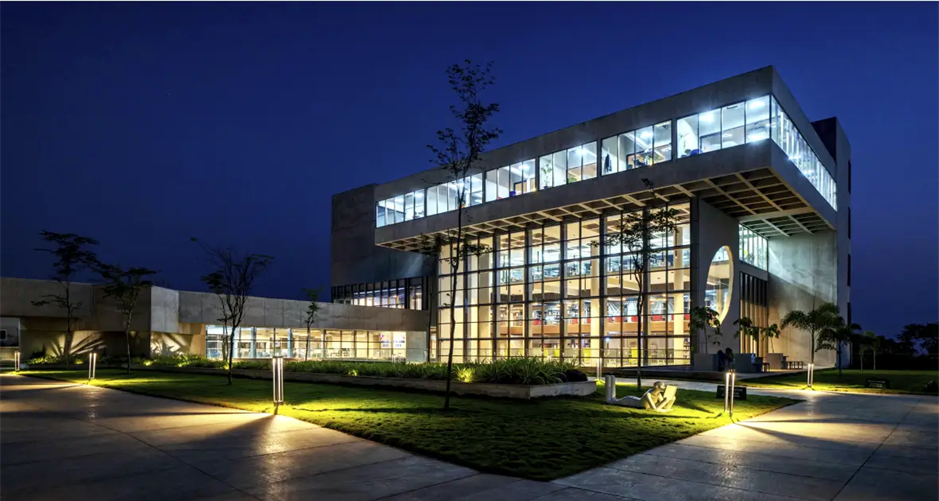
Unlocking Growth in Education with Sale and Leaseback Financing
In Frame: Woxsen University
India is a hotbed for organized formal education right now. Parents are signing up for admissions waitlists two-three years in advance, international universities are entering India, players are consolidating, and private equity has taken a keen interest in the space.
All this noise is making education promoters go back to the drawing board and rewrite their growth strategy. School and college owners are now incentivized to grow from a single-campus -institution, to a multi-campus group. There is a rising FOMO (so to speak) that the ones who do not capitalize on the market opportunity will be big losers a decade from now.
However, the challenge with growth lies in accessing capital to fuel this expansion. Sourcing debt for new projects, including launching a second/third/fourth campus, can vary in difficulty due to credit worthiness, collaterals, business plan, loan terms and interest rates, and lender relationship.
Amidst all the chaos, Sale and Leaseback transactions have emerged as an innovative source of financing as more people want a piece of the growing Indian education market.
India’s Formal Education Sector Presents Ripe Opportunities for Alternative Investments
1. The Booming Middle Class is Demanding Better Education
Source:PRICE
India’s education market is growing fast, fueled considerably by the burgeoning middle class. As more families ascend into the middle-income bracket and higher, there’s a heightened demand for quality education for their children. These parents are professionals / entrepreneurs who understand the value of good education and insist on better for their children.
2. The Private Sector is Capturing a Large Share of the Growing Education Market
Source: Central Square Foundation, UDISESource: ISC Research
Consequently, this surge in demand is driving an increase in the number of premium and international schools across the country. This trend doesn’t halt at the school level; it extends further to higher education, resulting in a growth of colleges as well.
Source: AISHE
3. Everybody Wants a Piece of the Pie; EdTech Players are Venturing Into Formal Education
Higher Education is all the buzz with new age companies coming in with full time programmes:
Masters’ Union: UG and PG Programmes in Technology and Business Management. Location: GurgaonDigiAccel: PGP and PGPEx in Applied Marketing. Location: GurgaonNxtWave: NxtWave has launched NxtWave Institute of Advanced Technologies (NIAT) offering 4-Year Programme in Computer Science. Location: HyderabadScaler School of Technology: Scaler has launched a 4-Year UG Programme in Computer Science. Location: BengaluruMesa School of Business: PG Programme in Startup Leadership. Location: BengaluruSource: Internal Research
K-12 is new, but PW has set momentum by starting its CBSE-affiliated Gurukulam School in Gurgaon, with another expected to be launched in Varanasi soon.
It is clear that the formal education is set for rapid growth, and that there is going to be an increasing requirement for high quality education from K-12, through to higher education.
Ambitious operators are scaling up and launching new campuses across the country to capture this opportunity, and continue to explore innovative ways to finance their expansion.
Sale and leaseback financing has emerged as a creative solution amidst all the noise, enabling players to become multi-campus quickly.
A Sale and Leaseback transaction is simple, with winners on both ends of the deal
Source: Internal
At its core, sale and leaseback financing offers a simple yet powerful proposition. It allows operators to go asset light and focus on their core proposition, education. On the other hand, it gives investors access to long term lease contracts in one of the most stable asset classes in India.
Standard contours of a transaction are:
1. Sale of Property:
The PropCo enters into a Sale Agreement with the Investor Entity to purchase the campus infrastructure of an institution, including academic blocks, sports facilities, auditorium, and allied facilities (“Transaction Property”)The Institution enjoys full access to the Transaction Property and continues to run the Institution similar to prior to the transactionThe nature of the transaction allows the Sellers/PropCo to enjoy a market premium on the sale proceeds
2. Leaseback:
The Investor Entity enters into a Lease Agreement with the Institution or the Operating Entity for the Transaction PropertyLease Period ranges from 20–40 yearsA coupon rate is paid by the Operating Entity to the Investor Entity at a predetermined rate, which escalates every three years
Growth-Driven Operators See Six Core Benefits to the Sale and Leaseback Model
Photo by Jose Vazquez on Unsplash
Education promoters have found that starting a new campus typically requires a large cash sum, which is difficult to finance using debt. Lenders often hesitate to finance new projects, which slows down growth prospects for operators.
Simultaneously, operators are seeing that going asset-light is a smarter and easier approach to grow from a single campus institution to a multi-campus group. The story of platforms such as K-12 Techno Services, which has grown to 100+ schools, largely relying on an asset-light approach.
There are six key tenets that incentivizes promoters to choose sale and leaseback financing over other forms of financing:
Focus on Core Operations: Sale and leaseback allows promoters to go asset-light and focus on their core educational operations, and keep an eye on growing their brand across IndiaLarge Capital Pool: Promoters typically receive sizable proceeds as a part of the transaction which they can use to set up new campuses, hire a quality pool of management talent, investment in research and development, and grow at a fast paceLong Term Partnerships: Investors and promoters enter into long term partnerships as a part of the transaction, and Investors are more than willing to reinvest into groups that have demonstrated the ability to meet their commitments as a part of the sale and leaseback arrangementsCheaper Cost of Capital: Sale and leaseback provides access to capital at a lower cost compared to raising equity. By monetizing existing real assets, promotors are grabbing growth capital without diluting ownership or relinquishing control. Moreover, by unlocking capital tied up in real estate, promoters can deploy that capital more effectively in core operations, thereby increasing the return on capital employed (RoCE)Immediate Access to Capital: Private equity investors are seasoned professionals who work quickly to deploy their capital into high performing assets. Promoters can work with financial advisors on the sell-side to manage the process and close the transaction within 3–6 months (including due diligence and documentation)Investor Portfolio Support: Private equity investors offer more than financial backing — they bring industry experience and a solid network to the table. With an understanding of the education sector, investors are happy to offer provide strategic guidance and operational insights. They also leverage their network in the industry to offer support to promoters wherever possible. Both parties are typically aligned on this interest, as it is mutually beneficial for them
Internationally too, operators have leveraged sale and leaseback models to grow their business. In 2016, Nord Anglia Education announced that it entered into agreements with W. P. Carey Inc. for the sale and leaseback of its Windermere Preparatory School in Orlando, Florida, North Broward Preparatory School in Coconut Creek, Florida and The Village School in Houston, Texas. Similarly, there was speculation in the market that the promoters of GEMS Education too were considering hiving off its real estate assets under a REIT to continue their rapid expansion.
The Case for Private Equity Investment in Education Infrastructure is Powerful
With the private education sector evolving swiftly and a growing desire for promoters go asset-light and scale their businesses across the country, there’s a robust opportunity for private equity vehicles to come in and build infrastructure portfolios of high-quality schools and colleges in major Indian markets.
Alta Capital recently announced that it is looking to invest over $1 billion in education infrastructure in India over the next 3–4 years. The fund had purchased Goldman Sachs’ and Warburg Pincus’ 100% stake in Good Host Spaces, for $320 million in 2023.
Cappella, a Hyderabad based Edu-Infra company, has tied up with groups such as Jain Group of Institutions and Sancta Maria International School, with a portfolio of 3,000 beds, 12 student housing assets, 2.3 million sq. ft. built up, and 100+ acres of land.
Source: Internal ResearchLarge, Fast-Growing Market: Education is a huge business in India. It is the underscore of the fastest growing economy in the world, and what will continue to power India’s journey as one of the major powers globally. The sector has almost 28,000 private unaided colleges, ~500 private universities, and more than 3,35,000 private unaided schools. The education market in India is growing at a 14% CAGR to reach a value of $225 Billion in 2025Long-Term Customer Journey: Customers in education are extremely sticky. In the context of K-12 schools, barring location changes or move to coaching institutions (Kota, Chaitanya, Narayana), the churn rate is less than <10–15%. As you move from schools to colleges, this statistic drops significantly owing to the nature of higher education — considered to be one of the most important milestones in any professional’s journey. Moreover, all customers in the market pay an increasing fee every year (which can range from 7% to 15–20%)Rise of Platform Operators: The market in India has evolved to a stage now where groups have demonstrated the ability to grow to multi-campus, multi-city operations. Orchids International School has 90+ schools in 25 cities, Ryan Group has 150 schools in 40 cities, Lighthouse Learning has 50 schools + 1,300 preschools in 360 cities, VIBGYOR has 36 schools in 13 cities; the list goes on. On the higher education front, platforms such as GUS Education (Pearl Academy, UPES) are coming up. The platform operators are proving that education brands are not limited to local markets, and that powerful brands can build a stellar reputation across cities by delivering first-class pedagogy and academic resultsInvestment in Social Infrastructure: Investing in social infrastructure, particularly in education, aligns closely with Environmental, Social, and Governance (ESG) principles, making it an increasingly attractive as an asset class for private equity groups with an ESG radar. This asset class not only generates solid financial returns but also delivers substantial social impact, addressing critical societal needs in a market like IndiaLow Risk Profile: Long-term leases (as long as 30 years) provide stability and ensure consistent cash flows over time, with year-on-year lease rent increments. Education being as a recession-proof industry adds another layer of security, making it an attractive investment opportunityFavorable Investment Ecosystem: The entry of institutional investors such as KKR, Morgan Stanley, InvestCorp, and Kedaara Capital have brought additional capital and expertise to the sector. Additionally, in a growing economy like India, private equity investors are likely to see large capital gains owing to rise in real estate prices. Furthermore, the emergence of Real Estate Investment Trusts (REITs) provides robust exit opportunities, allowing investors to monetize their portfolio after building them over a few years.
While PEs Want to Build a Robust Portfolio, They Remain Highly Selective With Their Picks
Private equity firms aspire to construct a robust portfolio of education infrastructure investments. However, it is difficult space to source investment opportunities considering the degree of confidentiality and lack of publicly available information.
In Frame: The Gaudium, Hyderabad
From our conversations with PE investors, we understand that there five key identifiers for a group to potentially be a good fit in their portfolio:
Geographies: Priority is given to key markets, particularly metro cities such as Delhi/NCR, Mumbai, Pune, Hyderabad, Bengaluru, Ahmedabad, Kolkata, and Chennai. However, they also keep an eye out for leading groups in non-core markets such as Jaipur, Indore, Chandigarh, Lucknow, Patna, and the likeCurriculum: There’s a clear preference for schools offering international curriculum such as Cambridge and International Baccalaureate, as they typically attract the high-earning demographic of India and are located in tier-1 cities. PEs also invest in high-quality CBSE schools who have a proven record of delivering solid resultsLeadership/Management: It is essential that the group has a passionate leadership, one who envisions running the group for the next 20–25 years, in alignment with the lease period that the investor signs up for, ensuring stability and continuity in operationsEstablished Schools and Colleges: Private equity firms prefer established groups with a proven track record of delivering outstanding academic results and college placements. Institutions that have operated successfully for at least 5–10 yearsFinancial Profile: Growing enrolments and pricing power, leading to robust EBITDA margins that can comfortably support lease obligations
The rise of platform operators with successful multi-campus models underscores the scalability of formal education. This, coupled with the growing interest of private equity firms looking to build robust education infrastructure portfolios, creates a ripe opportunity for sale and leaseback financing. While still unexplored, sale and leaseback financing is a strategic tool that can power the growth story of educational groups for the next few decades; unlock true opportunity.
LoEstro Advisors is an investment banking firm specializing in sell-side fundraise and M&A advisory, along with a strong consulting arm. Recognized as the №1 financial advisor in education in India, we are the advisor of choice to India’s blue chip education businesses.
Over the last four years, we have grown to be one of India’s largest (in terms of M&A transactions) homegrown boutique investment banks, with $1billion + worth of combined deals closed across education, healthcare, consumer, and technology sectors.
Unlocking Growth in Education with Sale and Leaseback Financing was originally published in LoEstro Advisors on Medium, where people are continuing the conversation by highlighting and responding to this story.

